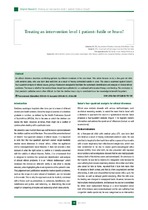| dc.contributor.author | Solomons, Nasheetah | |
| dc.contributor.author | Nortje, Nico | |
| dc.date.accessioned | 2017-06-02T11:17:16Z | |
| dc.date.available | 2017-06-02T11:17:16Z | |
| dc.date.issued | 2013 | |
| dc.identifier.citation | Solomons, N. & Nortje, N. (2013). Treating an intervention level 1 patient: futile or brave? South African Journal of Clinical Nutrition, 26(4): 176-180 | en_US |
| dc.identifier.issn | 0038-2469 | |
| dc.identifier.uri | http://hdl.handle.net/10566/2917 | |
| dc.description.abstract | An ethical dilemma describes conflicting opinions by different members of the care team. This article focuses on AJ, a five-year-old child
with cerebral palsy, who was born deaf and blind as a result of having contracted rubella in utero. The case is examined against Sokol’s
four-quadrant analysis of ethical issues, giving a framework designed to facilitate the systematic identification and analysis of clinical ethical
problems. The issue is whether the medical team should have palliated AJ, or continued with invasive therapy and feeding. The conclusion is
that paediatric palliative care is often difficult, but that the dietitian has a duty to contribute his or her knowledge to benefit the patient. | en_US |
| dc.language.iso | en | en_US |
| dc.publisher | Medpharm Publications (Pty) Ltd | en_US |
| dc.rights | This journal provides immediate open access to its content on the principle that making research freely available to the public supports a greater global exchange of knowledge. | |
| dc.subject | Palliative care | en_US |
| dc.subject | Ethics | en_US |
| dc.subject | Care team | en_US |
| dc.subject | Intervention level 1 | en_US |
| dc.title | Treating an intervention level 1 patient: futile or brave? | en_US |
| dc.type | Article | en_US |
| dc.privacy.showsubmitter | FALSE | |
| dc.status.ispeerreviewed | TRUE | |
| dc.description.accreditation | Department of HE and Training approved list | |

